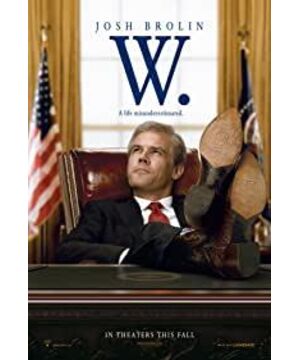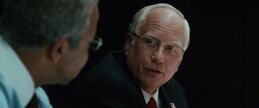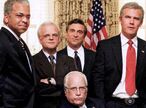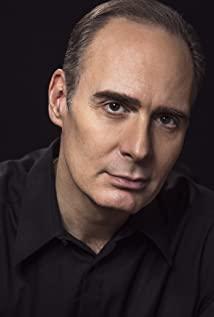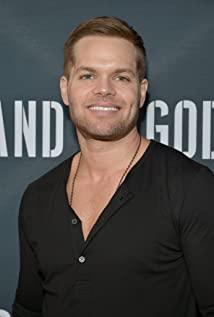From his person to his ridicule, and then from his ridicule to his own
"W" play, Oliver Stone achieved his goal as a historian, not just a filmmaker. Bush, who has been "fixed" in all directions, has appeared, and it is better than you think.
Alan Brinkley
News Weekly
published in the magazine on October 20, 2008.
Throughout the history of most films with the theme of American presidents, the focus on the truth has not been sufficient. From "Young Lincoln" (1939) to "Wilson" (1944), from "Rising Sun" (1960) to "October Missile" (1974), there are many others, usually used to flood cable TV and video tapes Vulgar and inferior goods, the purpose of these movies is mostly either for "famous", or "foreign propaganda", or both. "Young Lincoln" (Henry Fonda as Lincoln) depicts a saint-like lawyer dedicated to an idealized and incredible war for justice. "Wilson" is a mediocre work, because it played a role in the aftermath of the Second World War and won five Oscars, and it was naturally forgotten by people. "The Rising Sun", from a Broadway drama, praises Franklin Roosevelt’s brave conquest of "poliomyelitis" (a conquest that has never been achieved in reality), and depicts a "great American love story", despite this The real version of the story is a broken marriage that can never be restored. "October Missile" does not show the sheer chaos behind a seemingly unsolvable crisis, but only portrays a moral conflict in which wise triumphs over recklessness.
Oliver Stone's new work "W" is his third test of contemporary presidents, and he hopes that this time will be different. His first two presidential films-"John Fitzgerald Kennedy" (Annotation: "Who Killed Kennedy?") (1991) and "Nixon" (1995)-were published Yu's fascination with his youth, but also out of his interest in conspiracy theories, because the memory of the two presidents has been attacked by conspiracy theories. When chatting with me last week, Stone commented on "Who Killed Kennedy?" "Is defined as an "accusation film" (Annotation: J'accuse is English I accuse (I accuse), is an open letter to the French president published in 1898 by the famous French writer Emile Zola in the newspaper L'aurore. Zola in The letter accused the French government of anti-Semitism and the unlawful imprisonment of Alfred Dreyfus. This letter caused an uproar in France, and Zola was sued by the government for defamation, and later fled to the United Kingdom to escape imprisonment, and returned to China in 1899. Later, he returned to China in 1899. , The term J'accuse is borrowed from English to specifically refer to the righteous indignation and accusation against powerful people.) - indeed. The film is fascinated by some of the most powerful and inadequate interpretations of the Kennedy assassination, accusing the CIA (Central Intelligence Agency) and even Lyndon Johnson. Sworn as the thirty-sixth president of the United States on Air Force One) in order to prevent Kennedy from ending the Vietnam War, reconciling with Cuba, or becoming a stumbling block to others' leadership, contributed to the Kennedy assassination.
Stone believes that "Nixon" is a "calm, winter" film, trying to portray the loneliness and occasional despair of a man who is not loved with the utmost enthusiasm. In the film, Stone pays attention to conspiracy theories that are supplemented by information, and also uses "secrets" that do not have much credible evidence. Both films are supplemented with specially interpreted books to showcase the extensive research that helped shape the script. Both films have also been highly criticized by historians and others who question the authenticity of the materials Stone used and the rationality of the conspiracy theories he is willing to use. However, whether credible or not, Stone is committed to making a real contribution to history through his two films, as he said, "helping to create an understanding of our time." He insisted on the accuracy of his works, and rarely easily used "that's just a movie" as an excuse.
It may be more difficult to portray an incumbent president. Usually, most of these efforts were overturned by subsequent research on archived archives. Political enthusiasm affects the interpretation of facts. When Warren G. Harding passed away in 1923, people mourned him like Lincoln, but history to this day regards him as one of the most incompetent and idiotic presidents of the United States. (Annotation: Warren Gamarell Harding, the 26th President of the United States, has been criticized in history because of incorrect appointments that led to corruption during his term.) Dwight D Eisenhower was criticized in the 1950s and 1960s His historians dismissed as a dull and mediocre person, but today he enjoys a high reputation. (Annotation: Dwight David Eisenhower, the 34th President of the United States, served two consecutive terms. During his tenure, the American society experienced a post-war period of stability and prosperity. He signed the "Korea Armistice Agreement" and proposed to interfere in the affairs of the Middle East. Eisenhowerism".) But people are always unable to resist the temptation to make instant evaluations of the president and other leaders, so it is not surprising that filmmakers, like many historians, are eager to join such discussions.
Almost all of Stone's important works are dark and pessimistic, which reflects his own (and more of his generation) disillusionment with American politics and power. Therefore, people may be surprised to find that there is a relatively optimistic and sympathetic picture in the portrayal of George W Bush, which may be the most abused president in American history. Stone claims that almost everything in the film is based on reliable research, and all scenes, except for a few dreams, can be reliably verified. (A website to clarify the information he cited is under construction.) Stone is certainly not an admirer of Bush. He was also frustrated by his administration. He argued that the Bush administration "disappointed the whole world and put the world in danger... Its arrogance is endless... its policies are irrational." However, he also declared that he had discovered Bush's order. Surprisingly and slightly stubbornly has its own cuteness. Stone said that Bush was "impatient, careful,... is a big bully", but also "attractive... is a good father, a good husband, and a good friend."
Whether it is Bush's supporter or His opponents can find in "W" what they can complain about. The "worrier" will be shocked or even annoyed by Stone's compassionate portrayal of young Bush-Josh Brolin plays Bush quite convincingly-Bush struggled with (and sometimes even bravely resisted) when he was young The threatening example set by his father. (And in this film, Bush Sr. repeatedly devalued his son, and almost made hands with him on one occasion.) The audience may be dissatisfied with Stone's uncritical or even admiring depiction of Bush's struggle with alcoholism in chronological order. And Ban Yi’s Catholic process was dissatisfied with the director’s portrayal of Bush’s 1994 governor campaign as a skilled and charismatic individual effort (although it was carefully choreographed by Karl Rove). The Bush and his advisers portrayed by Stone are sincere and idealistic in their belief in the wisdom of the Iraq War, which contradicts the widespread belief that more people believe that fanaticism, deception, and ambition are the true causes of this war. .
And the president's shrinking admirer group may be resentful of the occasional small scratches between Bush and the law described in this film. ("Who do you think you are, Kennedy?"-Bush scornfully asked his son when he was cleaning up one of his many "endgames" for Bush.) Although Stone may show respect for Bush's ability to quit drinking , But he added contemptuously: "The problem of alcoholism is gone, but the problem of recklessness has not changed." Bush and Laura's relationship became stronger because Bush once smashed the car into the garage door. Bush did so because Laura criticized him for a weak campaign speech in his first unsuccessful congressional campaign. Some Bush’s loyal fans were deeply dissatisfied with Stone's cruel portrayal of a Bush who was extremely vulnerable at the White House press conference. Bush tried hard to respond to a question about a mistake he made, but he did not. Failed-stammering, hesitating, evasive, and after a while he blamed himself for not being good at words.
In a certain scene of a dream scene filmed by Stone, W faced his own failure in Iraq and once again faced his father's disintegrating disappointment in his dream. At the end of the movie, Stone portrayed Bush from time to time as he portrayed Nixon: a frustrated, lonely man who was tortured for his unpopularity. In the usual impression of George W. Bush, nothing is more ingrained than the impression he left with calm confidence, resistance to hindsight, and reluctance to reconsider one’s own beliefs or decisions—and It was even more admired by his supporters. But Stone presents us a man plagued by insecurity. "I tried my best to get out of the abyss of hell, just to make myself independent!" Bush once roared like this when things went wrong in the film, seeming to think it was compared with the hard work he put in to save himself The setbacks and failures he suffered were somehow unfair.
No matter which side people support this unique double-faced man, they may be upset that Stone regards Bush’s decision to start the war as naive optimism—he sincerely believes that he is advancing "freedom" and is transforming the Middle East. To get better is to bring peace to the world. There is a scene in the film at a meeting in the Office of the President of the United States. Colin Powell The hawks headed by Sfield emphasized that unilateralism is completely different from the use of military means to resolve foreign relations. Because Bush tends to support the hawks headed by Rumsfeld, Powell has been greatly restricted in foreign policy, and he has been in the cabinet. The officials disagreeed on many occasions. They announced their resignation as Secretary of State on December 14, 2004, and were immediately accepted by the President.) In order to shape and limit the "containment principle" of US foreign policy for more than 50 years, especially Bush Sr. in 1991 Refusal to invade Iraq during the Gulf War. Between 2003 and 2003, the United States adopted the principle of containment against Iraq. That is, Saddam Hussein was not ousted after the Gulf War. However, the United States still passed severe sanctions, UN weapons inspections, stationed troops in Saudi Arabia and Kuwait, and banned Iraq. Fly zone patrols and regular air strikes adopted a containment policy against Iraq. However, since 2000, the above measures gradually lost their original containment capabilities. In 2003, the Bush Jr. administration abandoned the containment principle to use force against Iraq.). W abruptly and even somewhat contemptuously dismissed the principle of containment as a weak policy, and made the decision to start war decisively and seemingly a little carelessly. Stone hinted that Bush's move was all due to his efforts to beat his father, but he also hinted that the president did it out of his own belief in (in its meaning). "Justice and evil coexist", the W in the movie said when the war came, "and justice will prevail, but you must fight for justice."
Stone emphasized that he "has no intention of degrading or hurting this man... We are determined to show his reasons for starting the Iraq War." The film does provide specious evidence that Bush himself conceived, promoted, and rationalized the war. He resisted dissent and did not simply acquiesce to other people's opinions. In a disturbing scene with Dick Cheney (excellently played by Richard Dreyfuss), this person like Iago (an antagonist in Shakespeare’s tragedy "Othello") is considered to be "the devil is in The incarnation of the human world".) The general vice president flatly handed over a power of attorney for torture in front of Bush, confidently thinking that Bush would sign without objection, but he had made the wrong wishful thinking, not only empty-handed. After leaving, he was questioned sharply by the president. When Cheney left, Bush also told him that Cheney would not be allowed to speak when the two of them were with other people in the future. This hypothetical encounter between an almost pathologically mysterious old man and his sociable young boss implies a more complex and competitive relationship between the two, rather than as people are used to. As imagined-Bush is a passive beckoning girl.
Stone, like most other people who want to write chronicle biographies of their own time, did make some educated guesses about Bush that would be overthrown in the future. However, "W" is still different from most previous movies (including Stone's own) with the title of the president. Regardless of its dramatic characteristics as a film, and no matter how it will experience Bush’s portrayal of Bush under the contrast of historical truth, this film is generally a sincere attempt, trying to be relevant to this tenure. Find out the truth about almost everything that happened in the storm of the frenetic battle. There are no conspiracy theories, no wild guesses, no paranoia. Stone's film is not "The Biography of Saints", nor is it "outreach". It is, quite surprisingly, more or less just.
(The author is a history professor at Columbia University's Allan Nevins Lecture.)
URL: http://www.newsweek.com/id/163448
View more about W. reviews


